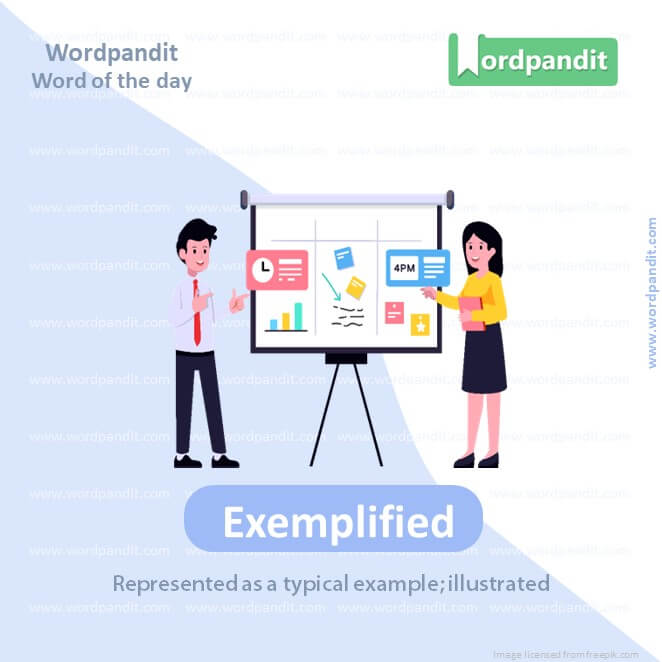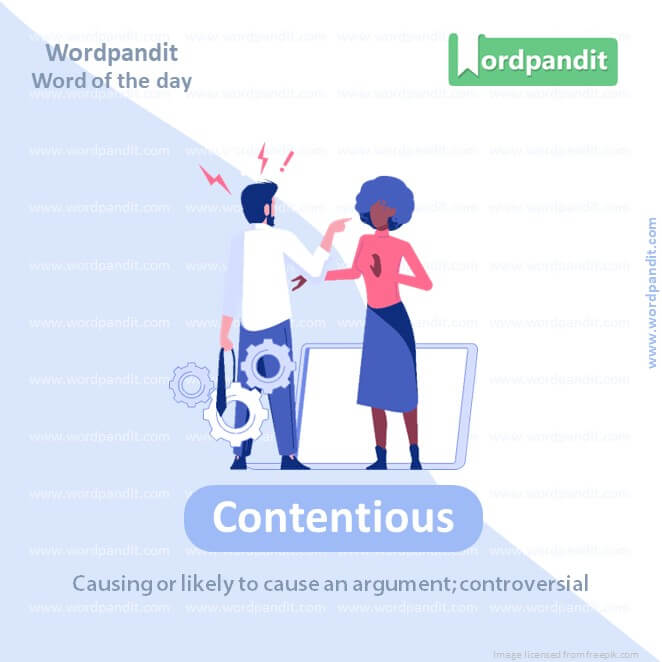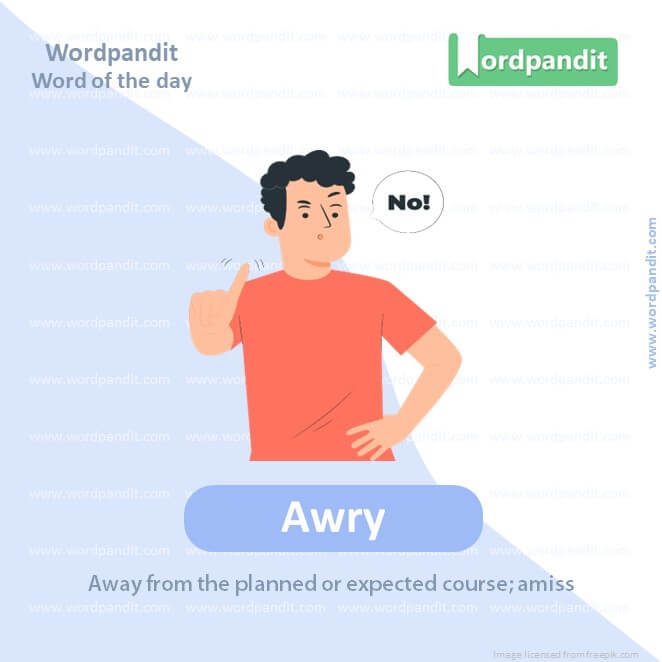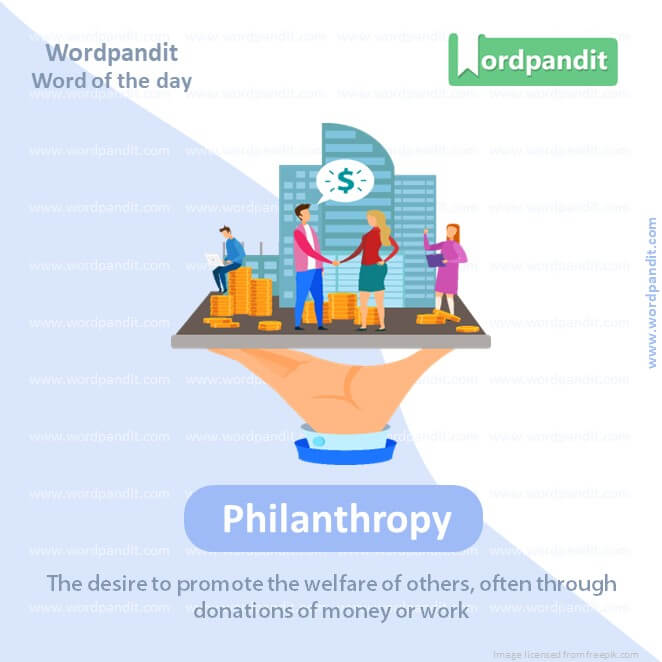Daily Vocabulary Words: List of Daily Used Words in Leading Indian Newspapers
Hi there. Welcome to this special section @ Wordpandit. Our endeavour here is straightforward: highlighting daily vocabulary words that you would come across in leading newspapers in the country. We have included the following newspapers in our selection:
• The Times of India
• The Economic Times
• Hindustan Times
• Mint
• Indian Express
We are putting in extensive work to develop your vocabulary. All you have to do is be regular with this section and check out this post daily. This is your repository of commonly used words; essentially, we are posting a list of daily used words. Hence, this has significant practical application as it teaches you words that are commonly used in leading publications mentioned above.
Visit the website daily to learn words from leading Indian newspapers.

WORD-1: EXEMPLIFIED
CONTEXT: The latest infrastructure project exemplified the government’s commitment to bridging the urban-rural divide.
SOURCE: The Times of India
EXPLANATORY PARAGRAPH: “Exemplified” is like when you show an example of something. Imagine you have a box of crayons and you show a blue one to explain what “blue” is. That’s how you “exemplify” the color blue.
MEANING: Represented asa typical example; illustrated (verb).
PRONUNCIATION: ex-EM-pli-fied
SYNONYMS: Illustrate, demonstrate, show, represent, embody.
USAGE EXAMPLE:
1. Her dedication exemplified the spirit of the team.
2. The artwork exemplified the artist’s early style.
3. The teacher exemplified the concept with a story.
4. His actions exemplified bravery.

WORD-2: DOMINANCE
CONTEXT: With its recent acquisition, the tech giant further cements its dominance in the Asian market, leaving little room for emerging startups.
SOURCE: The Economic Times
EXPLANATORY PARAGRAPH: “Dominance” is like when someone or something is stronger or more powerful than others. Imagine a big lion in the jungle; he’s the most powerful animal, so he has dominance.
MEANING: Power and influence over others (noun).
PRONUNCIATION: DOM-in-ance
SYNONYMS: Supremacy, authority, control, command, ascendancy.
USAGE EXAMPLE:
1. The company’s dominance in the market is clear.
2. The dominance of the older lion was challenged by a younger one.
3. The team showed their dominance by winning every game.
4. Cultural dominance influences the way people think.
WORD-3: SUBSERVIENT
CONTEXT: The editorial critiqued the current administration, arguing that the media should not be subservient to political interests, but rather uphold its responsibility towards the truth.
SOURCE: Hindustan Times
EXPLANATORY PARAGRAPH: “Subservient” is like when someone always listens and does what another person wants, even if it’s not good for them. Imagine a puppet that always moves when someone controls its strings.
MEANING: Prepared to obey others without questioning; less important; subordinate (adjective).
PRONUNCIATION: sub-SUR-vee-ent
SYNONYMS: Obedient, submissive, compliant, docile, passive.
USAGE EXAMPLE:
1. She had a subservient attitude towards her boss.
2. The role of the assistant was largely subservient.
3. He never wanted to be subservient to anyone.
4. In the story, the minions were subservient to the evil villain.

WORD-4: CONTENTIOUS
CONTEXT: The proposed land acquisition bill has become a contentious topic, with farmers and industrialists on opposite sides of the debate.
SOURCE: Live Mint
EXPLANATORY PARAGRAPH: “Contentious” is when something causes a lot of arguments or disagreements. Imagine a toy that two kids want to play with at the same time, and they start arguing about it.
MEANING: Causing or likely to cause an argument; controversial (adjective).
PRONUNCIATION: con-TEN-shus
SYNONYMS: Controversial, debatable, disputable, arguable, polemic.
USAGE EXAMPLE:
1. The new law was highly contentious.
2. The topic became a contentious issue in the meeting.
3. Climate change is a contentious subject for some.
4. Their contentious relationship always led to arguments.
WORD-5: MULTIFACETED
CONTEXT: The city’s art festival showcased a multifaceted display of talent, ranging from traditional dances to digital art installations.
SOURCE: Indian Express
EXPLANATORY PARAGRAPH: “Multifaceted” is like a beautiful gem or diamond with many sides or faces. It means something has many different parts or aspects.
MEANING: Having many different aspects or features (adjective).
PRONUNCIATION: mul-tee-FA-se-ted
SYNONYMS: Versatile, varied, complex, manifold, diverse.
USAGE EXAMPLE:
1. The problem is multifaceted, requiring solutions from different angles.
2. She has a multifaceted personality.
3. The city is multifaceted, offering both historical and modern experiences.
4. The project is multifaceted, combining art, science, and technology.

WORD-6: AWRY
CONTEXT: What was meant to be a routine procedure went awry when technical glitches delayed the launch of the satellite by several hours.
SOURCE: The Times of India
EXPLANATORY PARAGRAPH: “Awry” is when something doesn’t go as planned or looks a bit off. Imagine if you tried to build a tower with blocks, but it started leaning to one side. That tower went awry.
MEANING: Away from the planned or expected course; amiss (adverb/adjective).
PRONUNCIATION: a-RYE
SYNONYMS: Amiss, wrong, askew, astray, off-course.
USAGE EXAMPLE:
1. The picnic plans went awry because of the rain.
2. His hair was all awry after playing outside.
3. Their project went awry due to a lack of planning.
4. The arrow shot awry and missed the target.
WORD-7: MANIFESTATION
CONTEXT: The recent protests can be seen as a manifestation of the public’s growing concern over environmental degradation.
SOURCE: Hindustan Times
EXPLANATORY PARAGRAPH: “Manifestation” is how something shows up or appears. Imagine if you were thinking of your friend and then they suddenly appeared at your door. Their appearance would be a manifestation of your thoughts.
MEANING: A clear appearance or display of something (noun).
PRONUNCIATION: man-i-fes-TAY-shun
SYNONYMS: Display, demonstration, showing, presentation, evidence.
USAGE EXAMPLE:
1. The rally was a manifestation of the people’s unhappiness.
2. Flowers in spring are a manifestation of nature’s beauty.
3. The artist’s work was a manifestation of his emotions.
4. The sudden storm was seen as a manifestation of nature’s power.

WORD-8: PHILANTHROPY
CONTEXT: The billionaire’s commitment to donating half of his wealth to education is a significant step forward in the realm of Indian philanthropy.
SOURCE: The Economic Times
EXPLANATORY PARAGRAPH: “Philanthropy” is like when someone wants to help others and make the world better. They might give money to schools or hospitals because they care about people.
MEANING: The desire to promote the welfare of others, often through donations of money or work (noun).
PRONUNCIATION: fi-LAN-thro-pee
SYNONYMS: Charity, benevolence, generosity, humanitarianism, public-spiritedness.
USAGE EXAMPLE:
1. The billionaire is known for his philanthropy.
2. Many universities benefit from philanthropy.
3. Philanthropy can have a big impact on community development.
4. She was honored for her philanthropy and dedication to education.
WORD-9: RETREAT
CONTEXT: Many urban dwellers are now looking for retreat spots in the hills, away from the hustle and bustle of city life, leading to a rise in eco-tourism.
SOURCE: Live Mint
EXPLANATORY PARAGRAPH: “Retreat” is like when you decide to go backward or away from something. It can also be a quiet and peaceful place where you go to relax or think.
MEANING: (1) An act of moving back or withdrawing (noun). (2) A quiet or secluded place where one can rest and relax (noun).
PRONUNCIATION: re-TREET
SYNONYMS: Withdrawal, fallback, sanctuary, hideaway, refuge.
USAGE EXAMPLE:
1. The army made a strategic retreat.
2. She booked a weekend retreat in the mountains.
3. After the intense meeting, he needed a moment of retreat.
4. The spa offered a perfect retreat from the busy city life.
WORD-10: URNS
CONTEXT: The archaeological dig in the ancient town unearthed a collection of beautifully crafted urns, shedding light on the region’s rich history.
SOURCE: Indian Express
EXPLANATORY PARAGRAPH: “Urns” are like big pots or vases. Sometimes people use them to put flowers in, and sometimes they are used to hold the ashes of someone who has passed away.
MEANING: Large, decorative containers, often used for flowers or the ashes of someone who has died (noun).
PRONUNCIATION: URNS
SYNONYMS: Vase, vessel, container, jar, pot.
USAGE EXAMPLE:
1. The flowers were arranged beautifully in the urns at the entrance.
2. The family decided to place her ashes in an urn.
3. The museum displayed ancient urns from the Roman era.
4. The urns were carved with intricate designs.







